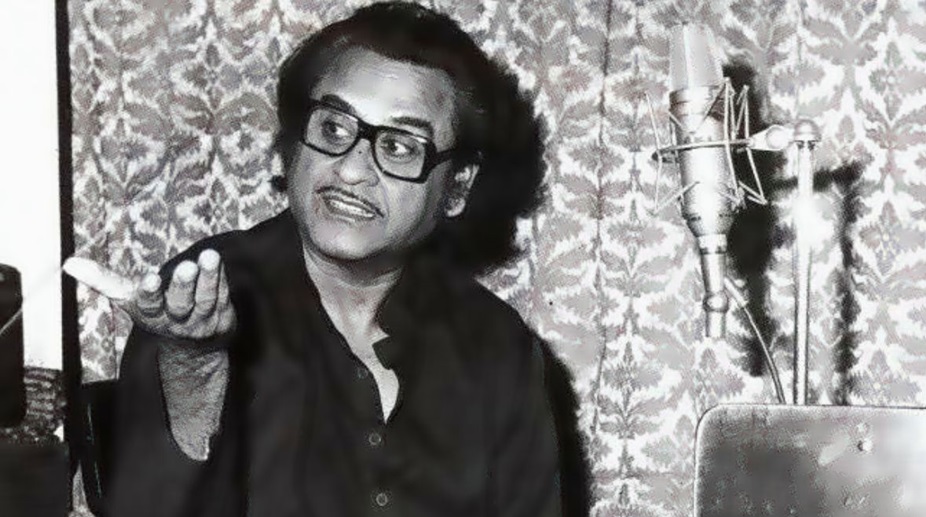Subhash Ghai reveals Laxmikant sang ‘Om Shanti Om’ before Kishore Kumar’s iconic version
Filmmaker Subhash Ghai recently revealed that late composer Laxmikant recorded “Om Shanti Om” before Kishore Kumar.

A complete entertainment package in Bollywood — a playback singer, actor, lyricist, composer, producer, director, and screenwriter, he was also its biggest eccentric. And that is why while Kishore Kumar’s mellifluous, versatile voice still permeates some of Indian cinema’s biggest stars from Dev Anand to Dharmendra, and Rajesh Khanna to Amitabh Bachchan in a range of emotions, moods and situations, his own onscreen prowess is forgotten.
Everyone has their own range of favourite songs from Kishore Kumar (1929-87), whose 30th death anniversary is on October 13, but if you ask about his film roles, most people might only remember “Chalti Ka Naam Gaadi” (1958) where he starred with his elder brothers Ashok and Anup, or his over-the-top depiction of a pan-chewing music ‘ustad’ in “Padosan” (1968). But there was much more to him as an actor.
Advertisement
While he has nearly 3,000 songs (including a duet where he sings the female side in falsetto) from 1,200 odd films, he also went to act in about 90 films between 1946 and 1990.
Advertisement
Why he is not as famous for them is that most of these came before 1970 or bombed at the box office, and why he didn’t do more is rooted in his own whimsies and eccentricities, asking his servants to ward off filmmakers, biting their hand as they paid him money, or not turning up for work. In one case, where a director obtained a decree from the court, he only did what he was expressly told to do. You can imagine how that would have turned out.
But some of his performances — doing everything from madcap antics of young romantic leads to restrained and sensitive essaying of more complex and nuanced characters, marked him an actor as accomplished as a playback singer.
And on the occasion of the 30th anniversary of the stilling of a marvellous talent, let us take a look at a half dozen of Kishore Kumar’s roles from films known or forgotten, successful or disappearing without trace.
The Bimal Roy film was an apt depiction of the dreams of Indian youth, in its first decade of Independence, to put their lives on an even footing by getting jobs. As Rattan, who dreams of a steady job, so he can put up his widowed mother in a proper house and get his sick sister treated, Kishore Kumar is in turns hopeful, distraught (where his appointment letter is burnt by father of his girlfriend), heartbroken (as he finds the promised job is gone/he is too later for the appointment/a good turn backfires), putting a masterly performance as an aspirational everyman youth.
This was also another look at the new India, through the prism of its wide diversity – and with some contemporary resonances. Kishore Kumar plays Punjabi youth Anand who comes to the national capital but is unable to find lodging due to the landlords/landladies’ propensity for somebody from their own region. He impersonates a Tamilian but the problem starts when he falls in love with Janki (Vyjayanthimala). And what happens when their parents get into the act?
Also on the same theme as “Naukri”, this goes much ahead in stressing the dignity of labour with Kishore Kumar playing Madan with a rare blend of tomfoolery, sensitivity and empathy. He is a fun-loving student on whom his parents have already staked much but see their hopes dashed as he can’t get a job. The usual mixture of comedy, romance and pathos follow before there is a happy ending for all.
In his directorial debut, Kishore Kumar stars as a soldier who returns home to find that his family has been killed in a fire and the only survivor is his son (played by real-life son Amit) who has become mute due to the trauma. It is a moving tale of a father-son bonding, along with the other staples of Bollywood and the de rigeur happy ending.
One of Indian cinema’s earliest and accomplished sci-fi as well an example of some inspired acting from everyone from hero to villain, it has Kishore as stodgy Banarsi poet Sudarshan who goes in for a western makeover after coming to Bombay and falling in love. But then all mayhem breaks lose when his love interest’s loony scientist father invents a invisibility serum, Sudarshan drinks it and a villain will go to any end to steal the secret.
Little remains known about this romantic comedy, except that it was based on Shakepeare’s “Comedy of Errors” and one of the first film-writing ventures of Gulzar, but it allows Kishore Kumar to indulge in his penchant for inspired and quirky song, as well as sing onscreen one of his best songs – “Hawaaon pe likh do, hawaoon ke naam/Hum anjan pardesion ka salaam”
Advertisement